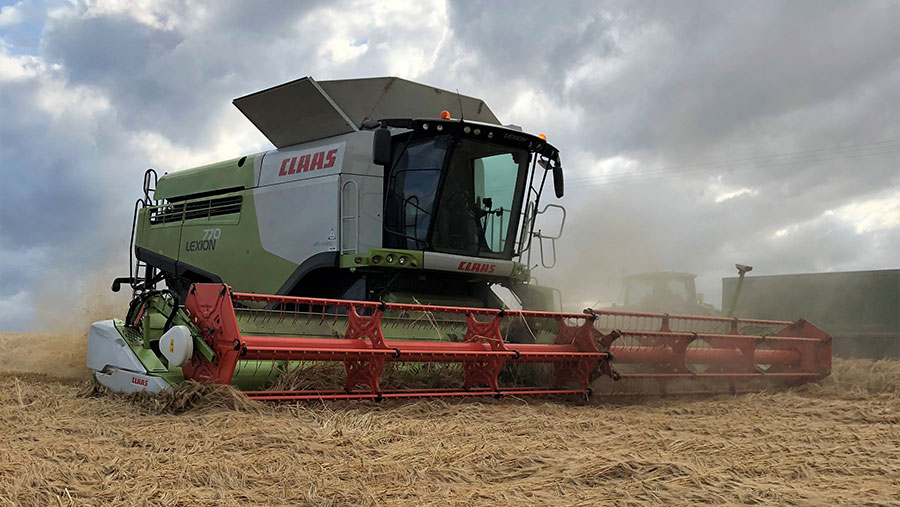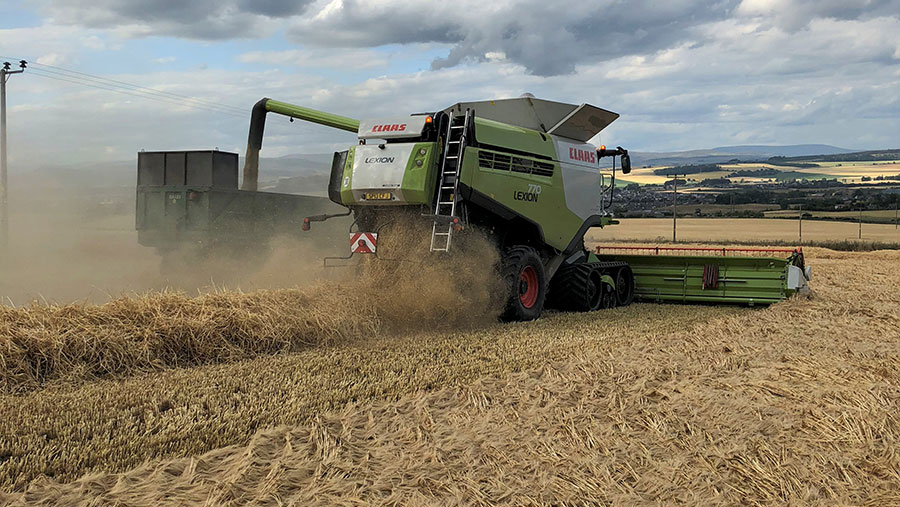Harvest 2018: English harvest disappoints but Scots happy
 © Mike Cummings
© Mike Cummings The winter wheat harvest is near completion in some parts of the UK with good quality but variable yields reported, while oilseed rape continues to disappoint.
Further north, winter barley harvest is drawing to an early close, with some excellent results in Scotland.
Cornwall
In Cornwall, Andrew Tamblyn had started to combine his JB Diego wheat at Pengelly Barton near St Neots.
“It’s better than we expected, and we have a good lot of straw – one of the benefits of living on the edge of Bodmin Moor,” he said.
Having cut 32ha of wheat so far, moistures have come in at 14-16%, with yields a conservative 7.4t/ha.
This year, harvest has been exceptionally early for Mr Tamblyn. He usually starts his spring oats over the August bank holiday, but this year he expects to have finished his whole harvest by then.
“The spring crops look fine but the straw might not be there.”
Wiltshire
Further east, Edward Parsons has finished his Campus oilseed rape at Templemans Farm near Salisbury. Although it yielded 3.7t/ha there were a lot of very red seeds.
“The rapeseed is alright – it was going to be a lot better but then the heat shrank the seed,” he said.
Wheat yields have been very dependent on soil type. Crusoe performed the best on chalky ground, averaging 9.8t/ha – well down from 11.1t/ha achieved last year.
On the sand and clay soils, yields were about 8.1t/ha. Bushel weights were 78-81kg/hl, with Hagbergs at 350-400.
“It’s great it has made the quality, but prices are dropping because everyone has good quality,” said Mr Parsons. High grain temperatures were also a concern, so he was cooling the wheat overnight.
However, straw prices were compensating for the loss in yields, at £60/t.
“It’s an average harvest – I thought it was going to be a disaster as we haven’t had any rain since 27 May, so considering the weather it’s OK,” he added.
Suffolk
In East Anglia, Stuart Baker was three-quarters of the way through his wheat at Ivy House Farm near Woodbridge and expected to be finished on Monday (30 July).
“The earliest ever finish was the 6 August in 1976,” he said.
“Everything has been disappointing – we’re half a tonne to three-quarters of a tonne down but it’s a miracle we’re getting anything with the weather we’ve had.”
Orwell yielded 8.5t/ha against a normal average of 10t/ha, but Mr Baker was very pleased with Grafton, which yielded 8.8t/ha, with bushel weights of 78-80kg/hl.
His oilseed rape, Elgar, yielded 4.15t/ha, while Wembley achieved 4.05t/ha and Flamingo 3.88t/ha.
“It’s a disappointing yield but prices make up for it. I’m amazed with the quality considering the weather.”
Scotland

© Mike Cummings
Further North, at Lour Farms, Forfar, near Angus, Mike Cummings has finished 62ha of Bazooka winter barley, with yields ranging from 10.2t/ha to 11.9t/ha and averaging 11.1t/ha.
The moisture content ranges from 13.6% to 14.1%.
“It’s the earliest I’ve ever cut a crop in 27 years on the estate,” said Mr Cummings.
“The winter barley has been fantastic – Bazooka really stood out and we would definitely go straight back to using it. It just has the standing power.”
He plans to cut his oilseed rape in 10 days and has high hopes for it, but is concerned about his spring barley yields due to late drilling.

